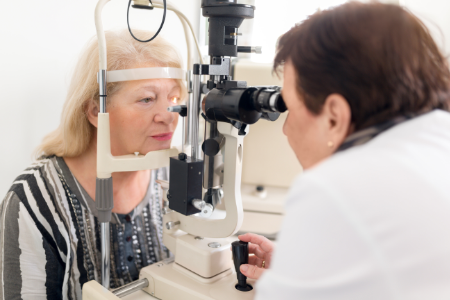 Do you need an optometrist or an ophthalmologist?
Do you need an optometrist or an ophthalmologist?- What should you look for in an eye doctor?
- How can you choose an ophthalmologist?
Regular eye exams are absolutely critical to protecting your eyes. But with so many choices and different specialities to consider, how do you pick an eye doctor who will be right for you?
Depending on the state of your eyes, you may have to visit an optometrist or an ophthalmologist. How can you know which one you need? This blog will help you understand the criteria you should use to pick an eye doctor to take care of your eyes.
Do You Need an Optometrist or an Ophthalmologist?
Generally, you see an ophthalmologist if you have a medical problem with your eyes, and you see an optometrist for your annual eye exam. The biggest difference between an optometrist and an ophthalmologist is their level of professional training. You would visit an optometrist if you:
- Are due for a routine eye exam
- Notice a problem with your eyes
- Experience blurry vision
- Need glasses or contact lenses
- Have minor medical conditions with your eyes that don’t require surgery
Optometrists typically pursue and graduate from a four-year postgraduate degree after four years in college. They also undergo training in residency for one or two years for a total of nine or 10 years of study. They can prescribe medications for eye conditions, conduct eye exams, and write a prescription for eye diseases.
By contrast, an ophthalmologist specializes in surgical eye procedures. An ophthalmologist is at the top of the profession and can even perform eye surgeries. Ophthalmologists have undergraduate training and four years post graduate study. They also spend not one or two, but four to seven years in residency, actually practicing their profession on patients.
From a treatment perspective, an ophthalmologist can perform all of the procedures that an optometrist can, but they can also:
- Perform surgery on your eyes like cataract removal
- Provide aftercare after a surgical procedure
- Treat all serious eye conditions
If you have eye pain, blurred vision, redness, itching, or any other troubling condition, you could go to either an optometrist or an ophthalmologist. If the problem is serious, the optometrist will refer you to an ophthalmologist for treatment.
What Should You Look for in an Eye Doctor?
 The first question to consider is what do you need as a patient? Are you just looking for an annual eye exam? If so, there are probably several good optometrists in your immediate area. You probably won’t have to travel too far, so the visit will be quite convenient.
The first question to consider is what do you need as a patient? Are you just looking for an annual eye exam? If so, there are probably several good optometrists in your immediate area. You probably won’t have to travel too far, so the visit will be quite convenient.
If you have several choices, you can narrow your options down by looking at some of the online reviews for the doctors in that practice. What are other patients saying about the staff and clinicians? You can also ask your friends and family for referrals. Look at the practice website to see what kind of credentials the doctor has along with their hours and what steps they are taking to keep you safe from COVID.
If you have vision insurance, it will often pay for a free preventative annual exam. Call your carrier and get a list of approved in-network providers. This will keep you from getting a surprise bill later on.
Finally, call the practice to make an appointment and see what it feels like. Is the staff kind and supportive? Are the office hours convenient? Do they offer weekend or evening appointments for those that work? What if you have an emergency, what is the procedure? Also find out how long it takes to get an appointment, particularly if your problem is urgent in scope.
Now suppose you have an eye condition. You know your next step is to see an ophthalmologist. Should you ask these same questions? Absolutely—and a few more.
How Can You Choose an Ophthalmologist?
Choosing an ophthalmologist is in some ways more difficult because you’ve got more riding on the visit. Say you’re going there for a serious eye condition or you know you’re going to need surgery. So, in addition to all of the questions and research you had when choosing an optometrist, you should dig just a little deeper to find the right fit.
Particularly research the credentials of the ophthalmologist. You’re looking for a board certified ophthalmologist, which means they’ve been qualified as a top-notch medical expert in their field. Take a peek at the doctor’s ratings on healthgrades.com and be sure there are no problems with his or her work.
When you call the practice, and when you meet the team there, it’s okay to ask questions about the credentials of the doctor and staff. After all, the more experience the ophthalmologist has with your condition or problem, the better. It’s even okay to ask how many patients has the doctor treated with your exact eye condition. Has the doctor ever encountered any complications with a surgery? What are the conditions the doctor can treat?
Some of the typical conditions treated by skilled ophthalmologists include:
- Astigmatism
- Blepharitis
- Cataracts
- Corneal ulcers
- Diabetic retinopathy
- Fuchs’ Dystrophy
- Glaucoma
- Hyperopia
- Keratoconus
- Myopia
- Ocular Surface Disease
- Presbyopia
- Pterygiums
- Visual disturbances
Look for a team that can handle comprehensive eye exams but also laser vision cataract surgery. They should be able to provide medications for dry eye but also perform corneal transplants. You are looking for a well-rounded, experienced provider that you also feel comfortable trusting your vision to.
Why Select the Jaffe Eye Institute?
For more than 70 years, the Jaffe Eye Institute staff has been serving the families of South Florida. We offer state-of-the-art compassionate care and our ophthalmologists are some of the most experienced in the nation. Contact us today to protect your vision for a lifetime.

